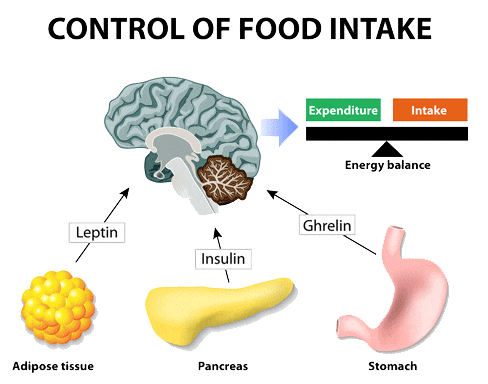Brain Food – Dietary Principles to Help Prevent Dementia and Alzheimer’s Disease
Controlling hormones can improve brain function, and help you lose weight, too
Hormones are chemicals produced by our endocrine glands to control and regulate behavioural and physiological activities. Insulin, leptin, and ghrelin are hormones that play an important role in brain function and appetite control. By understanding how to control these hormones through diet, we can help to naturally improve cognitive function, with the added benefit of weight loss.
The strongest link between diet and dementia, including Alzheimer’s disease, relates to high blood sugar levels. Over time, elevated blood sugar levels can lead to insulin resistance, where there is a diminished ability for our muscles and brain to respond to the action of insulin. When we consume sugar, or foods that convert to sugar, digestive enzymes convert the sugar into glucose and fructose. Glucose is our body’s primary energy source. When glucose levels rise in the blood, insulin is produced to transport glucose from the bloodstream into our muscle cells and other tissues. The glucose that isn’t used for energy is converted to triglycerides and stored as fat.
I believe it is important to avoid added sugar in all its forms, including honey, maple syrup, fructose - any sweetener that has a high glycemic load that produces an insulin response in the body. Strive for no more than six teaspoons of sugar (24 grams) per day. The American Journal of Clinical Nutrition found the majority of people are consuming three times the amount of sugar recommended by the American Heart Association. 
Some researchers are now referring to Alzheimer’s disease as 'type 3 diabetes', based on strong research showing that the brain, similar to our muscles, becomes resistant to insulin. In other words, type 2 diabetes progresses to the point where it starts to alter and even destroy brain function.
The most important dietary change we can make to improve brain function and reduce the risk of dementia is to choose foods that are low in sugar and high in fibre. Avoid high carbohydrate refined grains like white flour, white rice, or refined foods which convert quickly to glucose in the body. The high fibre levels in whole foods and grains results in a more gradual release of glucose into the bloodstream.
Sugar is often hiding in places where you least expect it, sometimes in foods considered healthful. Read labels carefully and look for zero added sugar and low carbohydrate levels in your food choices. Avoid sweetened yogurts, ketchup, and nearly anything where the label has ingredients that end in 'ose'. One of the worst is high fructose corn syrup (abbreviated HFCS), used to sweeten just about all processed foods and soft drinks. HFCS is linked to a host of health problems, including heart disease, obesity, cancer, dementia, liver failure, tooth decay, and more. Even more disturbing is a recent discovery that HFCS is high in mercury.
According to Barry M. Popkin, Ph.D, Professor, Department of Nutrition, University of North Carolina at Chapel Hill, HFCS is absorbed more quickly than other sugars, without stimulating the production of insulin or leptin. Dr. Popkin says the increase in consumption of HFCS has a temporal relation to the epidemic of obesity, and the overconsumption of HFCS in calorically sweetened beverages may play a role in the epidemic of obesity.
Many gluten-free ingredients including rice flour, corn flour, tapioca flour, and potato flour are high glycemic, and can cause an insulin reaction equal to refined white wheat flour, so going gluten-free is not the answer to controlling blood sugar. Whole grains usually provide a 10:1 ratio of carbohydrates to fibre, so when you read nutrition facts labels, if there are 20 grams of carbohydrates, strive for 2 or more grams of fibre.
Reduce Sugar. Increase Fibre. The Leptin / Ghrelin Connection
Ghrelin is the appetite stimulating hormone. Leptin is the hormone that signals the brain that we are full. Low leptin levels can make you keep eating, even when you’re full, because you don’t reach satiety when leptin levels are low.
Increasing levels of good bacteria with probiotic supplements and fermented foods can help balance leptin and ghrelin levels. Additional fibre in the diet can lower ghrelin levels, while eating more protein and important omega-3 essential fatty acids can help raise leptin levels. Foods high in omega-3 include chia seeds, flax seeds, walnuts, sardines, salmon, anchovies, and trout. Chia seeds are a superfood and nutritional powerhouse, with nature’s richest source of fibre and omega 3, high levels of antioxidants and complete protein. Chia seeds are tasteless, easy to incorporate into just about any prepared food or drink, and are especially impressive for raising leptin levels.
A great habit to get into is to stir two tablespoons of chia seeds in a glass of water with some freshly squeezed lemon juice each morning. Add a protein powder and a probiotic supplement to lower ghrelin levels even further. The result is increased and sustained energy all day long, with all the benefits of better insulin control.
By lowering ghrelin and increasing leptin, insulin levels will naturally drop, which is critical for preventing dementia, with the added benefit of helping with weight control.
Also see: Can’t Find Your Car Keys? How to Help Stop Those Senior Moments Before They Start
Health Disclaimer. Copyright ©2015. Nathan Zassman is a trained nutrition practitioner and the owner of Aviva Natural Health Solutions.
